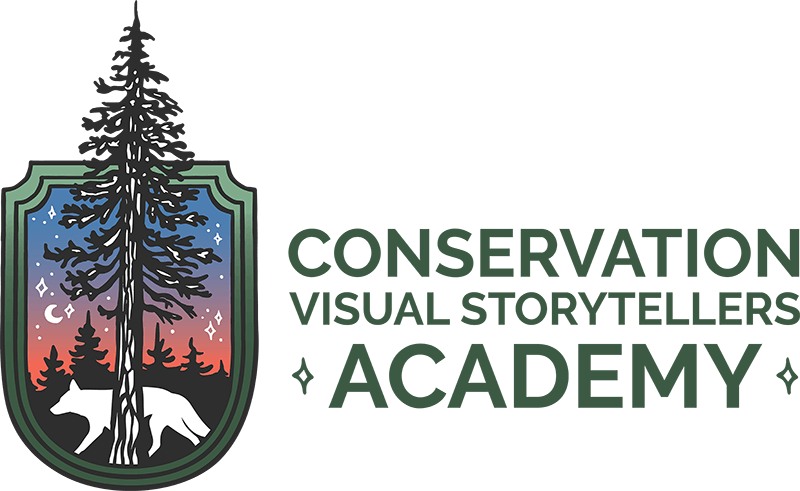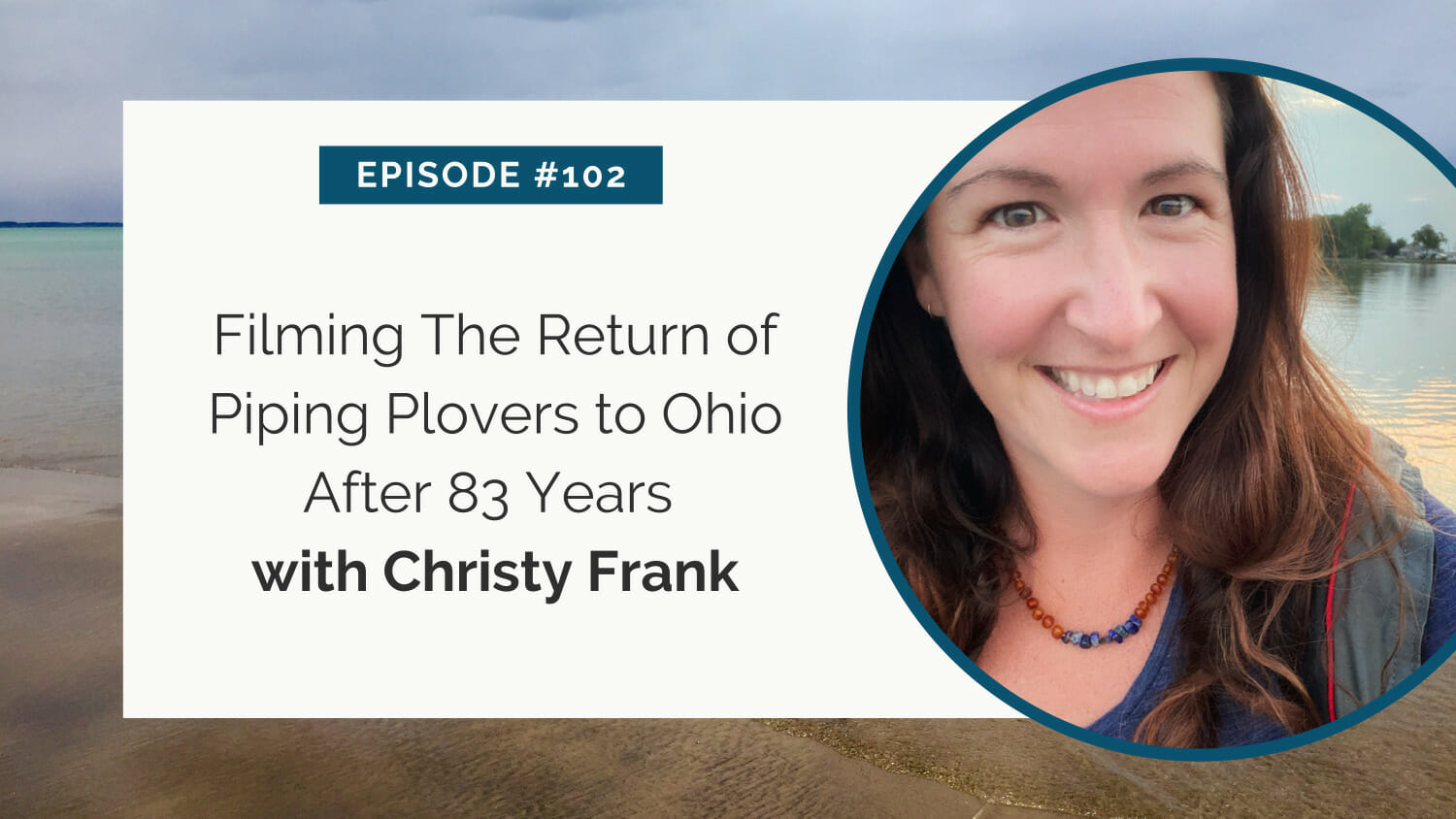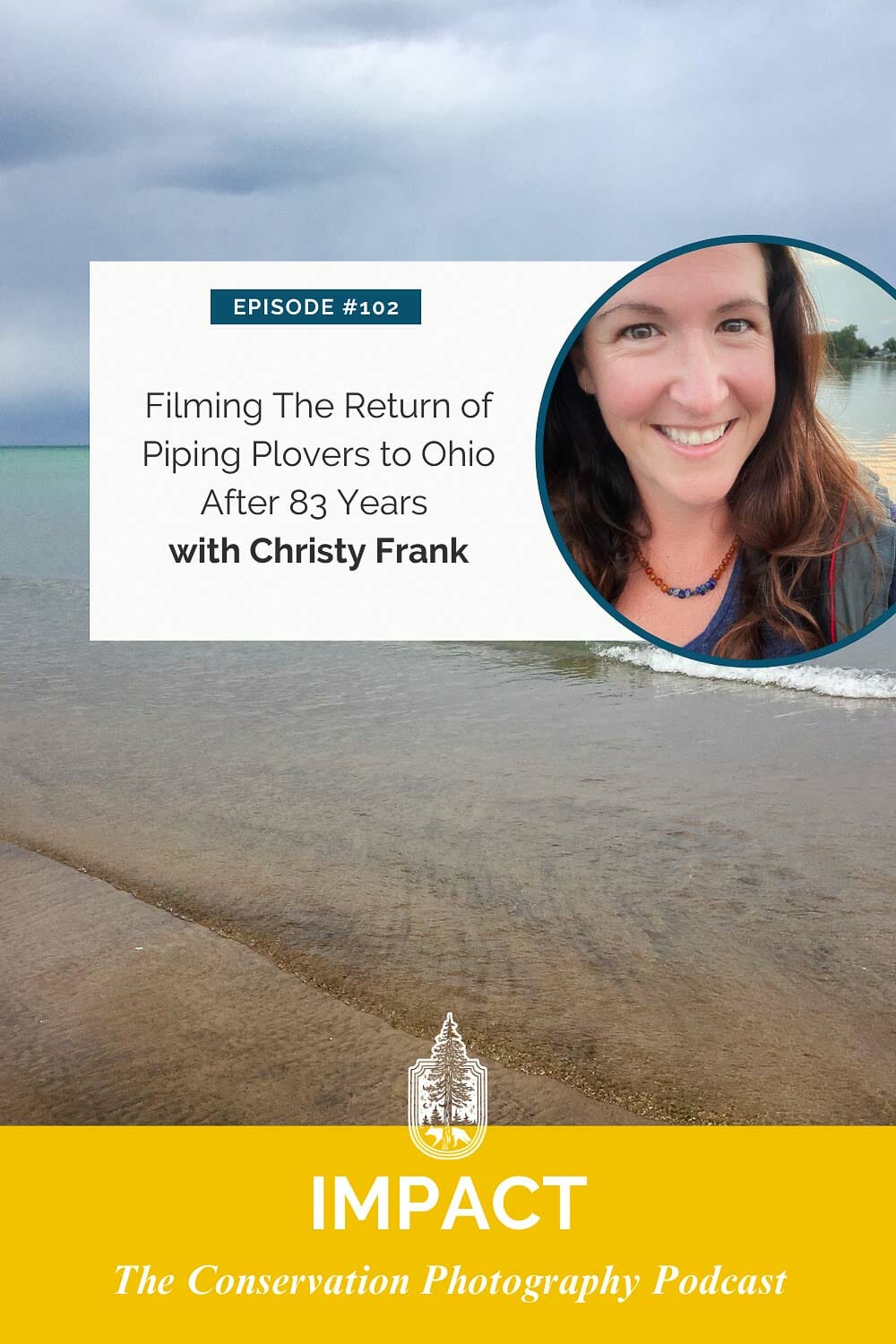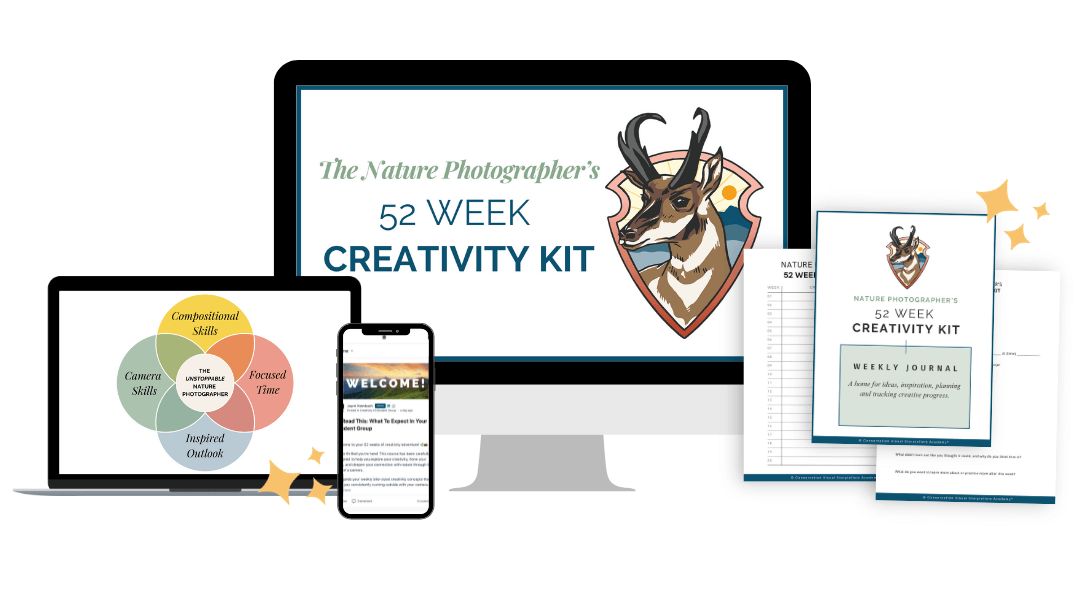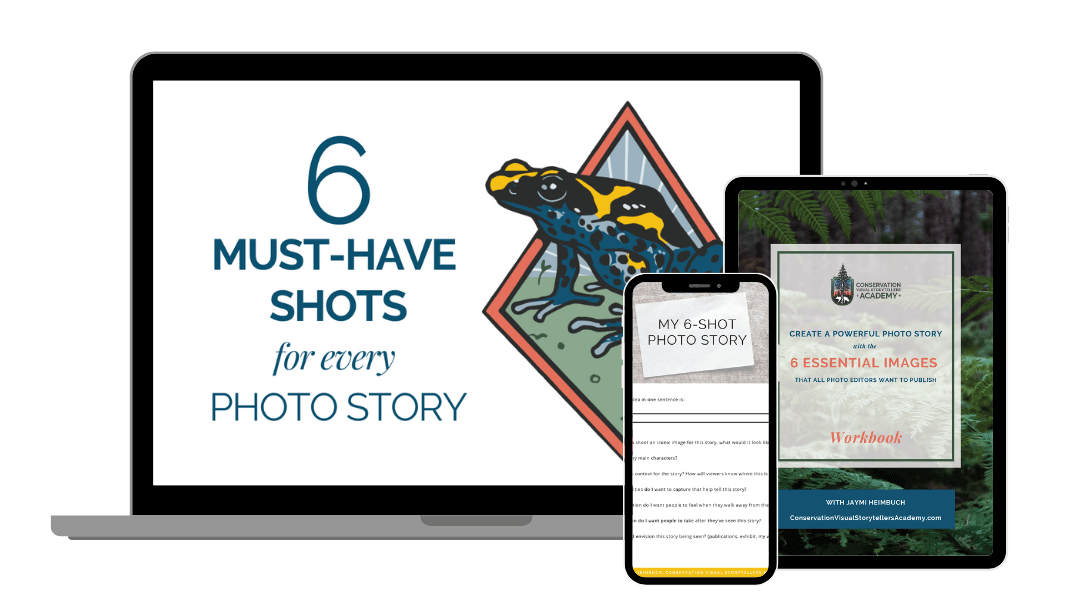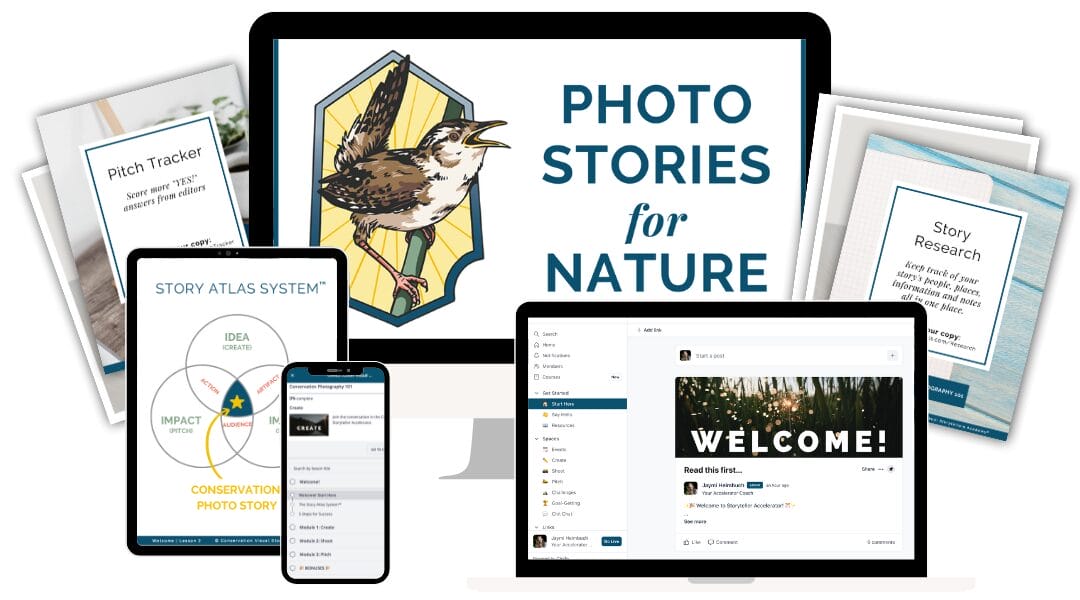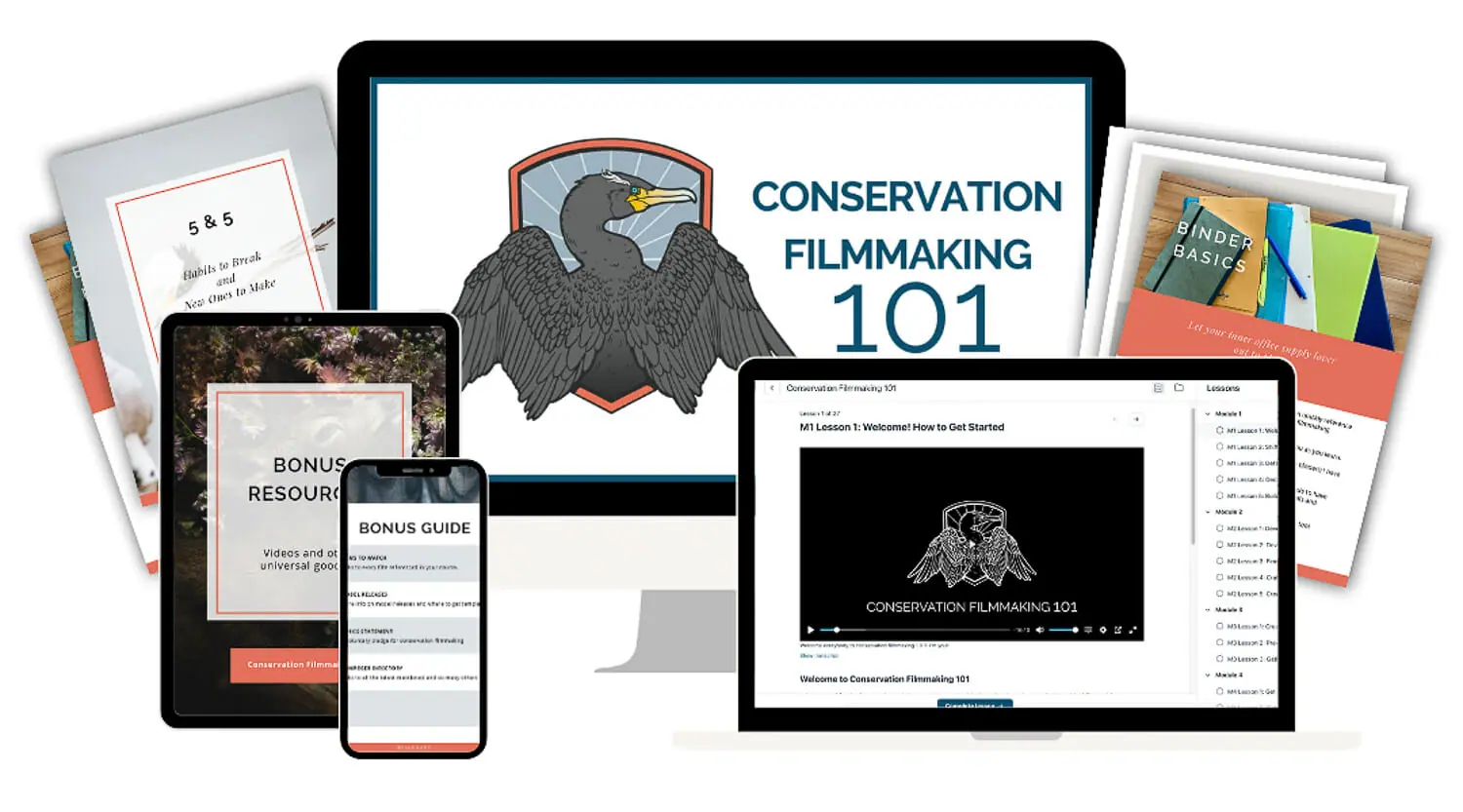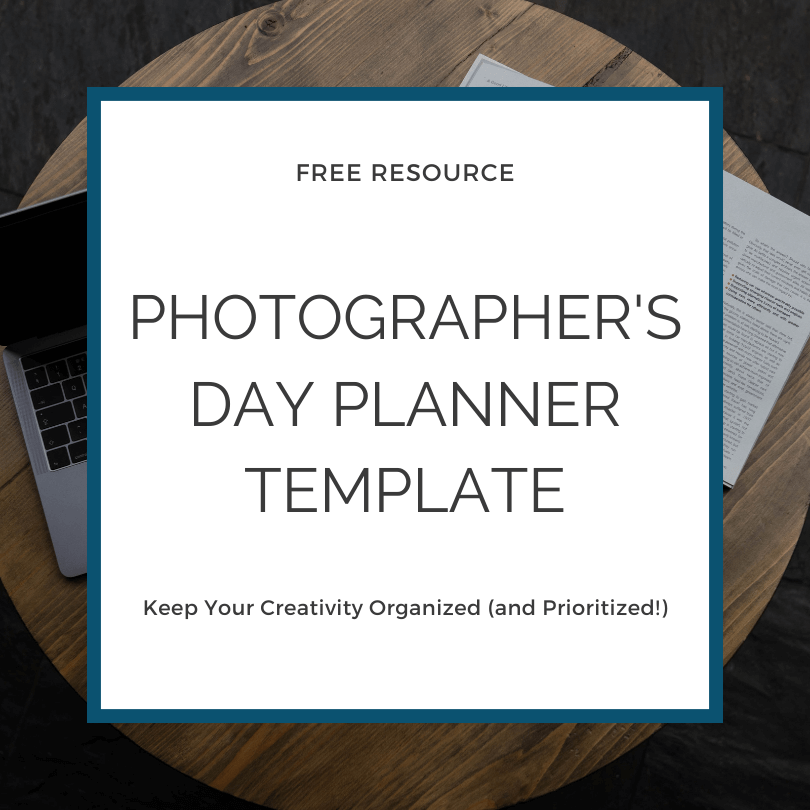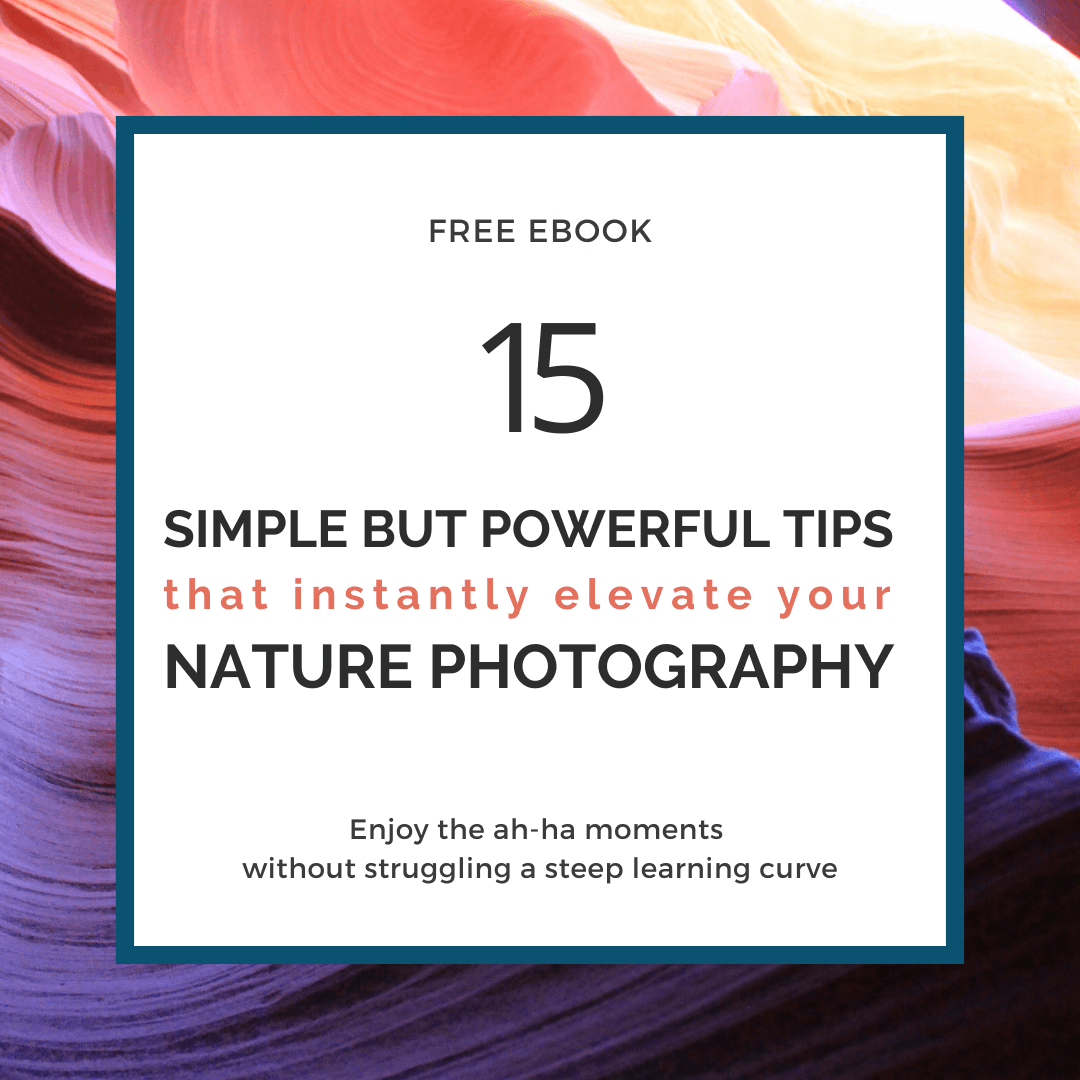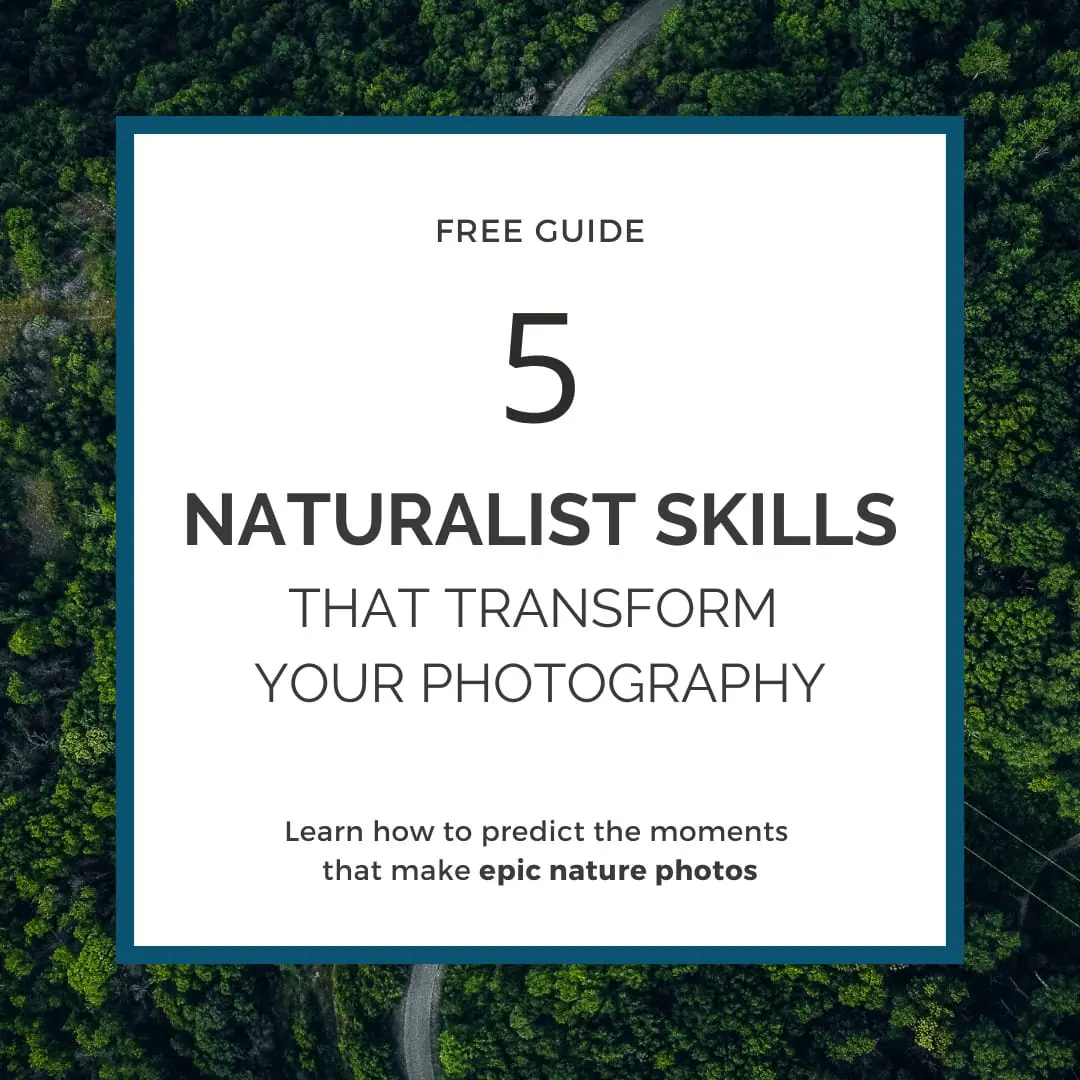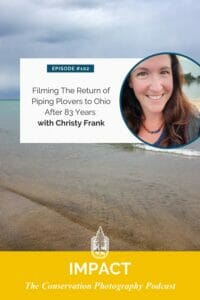Filming The Return of Piping Plovers to Ohio After 83 Years with Christy Frank
This filmmaker visited an extraordinary piping plover family every single day for an entire summer. Her short film details the drama and hope brought by the little Plover family that nested in Ohio for the first time in over 83 years.
Christy Frank is a wildlife conservation photographer and now a filmmaker based in Ohio who witnessed a truly extraordinary event… almost without realizing it.
A morning outing evolved into a summer of long days filming on the shores of powerful short film documenting the return of an endangered species to to the shores of Lake Erie.
In May 2021, a pair of piping plovers – lovingly named Nish and Nellie – nested for the first time in the area in over 80 years. The event is historic, and brought together over 100 volunteers to protect them on the busy beach they chose as a nesting site. The dramas never ceased with the family of fierce little feather-balls, and the people who dedicated their time in hopes to see the family thrive and bring the species back to the area.
Christy has brought the tale to life in a powerful short film title Ploverville.
You'll Learn:
- What it's like being a still photographer jumping into filmmaking
- How she pulled months' worth of footage into a 20-minute film
- Her conservation goals for the project
- How she's tracking the impact of the film
- Her hopes for piping plovers and what their presence means for other species in the area
Resources Mentioned
- Ploverville Film Website
- Make a donation to the Ploverville Project
- Christy Frank's website
- Christy on Instagram
- Conservation Filmmaking 101
- Conservation Photography 101
- Black Bird Swamp Observatory
- Episode 53: How To Find A Fiscal Sponsor For Your Conservation Photography Projects With Vance Martin Of WILD Foundation
Episode 102: Filming The Return of Piping Plovers to Ohio After 83 Years with Christy Frank
Shownotes: ConservationVisuals.com/102
(Digitally transcribed, please forgive any typos)
Jaymi Heimbuch:
jaymi: well, Christy, Frank, welcome. Finally, to impact the conservation photography podcast. I have wanted to get you on this podcast for a while now. So I'm really excited that we've been able to connect and talk about your film Ploverville so thank you so much for being here.
[00:00:17] christy: It is my honor to be here. I'm so excited to talk to you.
[00:00:21] jaymi: well, I always start out with apparently what is a very deep question, which is who are you in the world for anyone who doesn't know your photography or your work, who is Christie in the
[00:00:31] christy: world? that is a deep question. Whew. I am well, besides being a photographer, I'm a filmmaker as well. Now I guess I can say that now, since I've officially made a film yep.
[00:00:46] christy: I'm also a writer. And I read a ton. I'm a total nerd. I love science. And I have a very mushy heart I love that. [00:01:00] Yeah. I don't know. I'm I'm someone that's, I've kind of embraced the theme of being stubbornly joyful because I've, you know, we've all been through a lot and that's kind of one of my life things that even when things are tough, I try to stay stubbornly joyful.
[00:01:13] christy: So I guess those are me wrapped up together as much. I love it. I can describe, oh man.
[00:01:19] jaymi: The idea of stubbornly joyful. I think that that is almost like a critical thing that we need in our lives. Now I love that phrase so much. Well, so we are here to talk primarily about plover Villa, which is your first ever short film. But before we dive into that, what was your journey like from photography, which you were primarily in, into filmmaking?
[00:01:43] jaymi: Like what made you even wanna move into filmmaking?
[00:01:47] christy: So I started shooting B roll, actually. I was asked to kind of tag on and get behind the scenes footage for some other people. And I was able to see the impact that they had . You know, [00:02:00] capturing, you know, it's still storytelling.
[00:02:02] christy: It's, it's all storytelling. And I was able to see the different audiences that, that they were able to reach and just telling stories in a different way. And I kind of fell in love with it. I saw that when you learn to do both, it just gives you another tool in your, in your toolbox. And it's another part of your arsenal to get stories out there that matter.
[00:02:24] christy: So mm-hmm, , I think I just really wanted to learn how to do that in an impactful way. So I've taken some workshops. One of the ones is, you know, the one that Morgan Heim offers with conservation filmmaking and just have tried to really delve in and learn as much as I can as quickly as I can. Mm-hmm so I just.
[00:02:44] christy: I, I guess that was a really long way to answer that, but , I love long
[00:02:48] jaymi: answers.
[00:02:50] christy: it just, it just seemed like the next logical step to add. I still will always love still photography. Mm-hmm and that's always gonna be a part of me. I don't plan on, [00:03:00] on moving away from that. It's just that I wanna do as much as I can to get these conservation stories out there and to share what's happening in the world.
[00:03:08] christy: So if that's another way that I can do that, mm-hmm and add to that, then that's kind of how I ended up, trying to learn it.
[00:03:17] jaymi: Yeah. Well, you mentioned that you saw that filmmakers can reach a different audience. Can you tell me more about that?
[00:03:23] christy: I feel like a lot of times these days people will read.
[00:03:28] christy: Less and less as far as length when it comes to, I, I love being wordy, I, I am very wordy when I write. And I know that people's attention spans have gotten shorter and shorter. And, you know, if you look at social media and the things that tend to capture people's attention now, a lot of that has to do with video mm-hmm
[00:03:51] christy: And so the people that maybe aren't going to sit there and read one of my 1000 word articles would happily write or [00:04:00] watch a video that's got emotion and the story right in front of them visually
[00:04:04] jaymi: you know, one of the, well, I guess I'm gonna save this for a little bit later. But I, I do wanna talk about how.
[00:04:10] jaymi: The length of video matters so much as well. The length of a short film and how much you can really pack into it, a very short film. But what I often see is, as filmmakers are moving into the genre, as they're like growing from photographers into filmmakers, the films can tend to be really long.
[00:04:28] jaymi: And so you have to like be pretty diligent with editing and you, and we're gonna talk all about this. So for, for listeners, we're gonna, we're gonna get there. We are gonna dig into, to plot and everything as well, but well you chose a 20 minute length for this film. What goes into choosing length for a short film, especially when it comes to attention span or how you're gonna use it?
[00:04:48] christy: Choosing the length of the film was so difficult and I asked for a lot of advice and that's also advice I would give to anyone getting into this is don't be afraid to ask for advice and ask for [00:05:00] help and take it with a grain of salt, realize that your own opinion matters, but it definitely ask for advice and Everyone kept telling me shorter is better.
[00:05:09] christy: And I had so much footage cuz I mean, , I was there every single day. I never missed a day from the end of may all the way through to October. So you can imagine how much footage I had and to condense everything that happened all summer. And there was so much drama into a short amount of time.
[00:05:26] christy: I just, I didn't know how I was possibly gonna do that. And I think everyone that saw me filming thought it was gonna be like this feature length documentary. But one of the things that a lot of people told me was that the message will be more impactful. The shorter you can get the film But at the same time, a couple of people, Morgan Heim was one of them.
[00:05:47] christy: A couple of people gave me really good advice about, you need to make sure that whatever you need to do to tell the story is what matters. So I couldn't really, I wanted to get it shorter than that. I really [00:06:00] couldn't. I didn't, I couldn't figure out a. Anything in there that I wanted to cut at that point.
[00:06:04] christy: So that's kind of how I ended up with that time length.
[00:06:08] jaymi: Got it, got it. So that I, I have to admit, I really wanted to see the film before our interview, so I could be super prepared. Cause I wanna talk about the conservation impact of, of the film itself. But I was like, I really wanna see the film before we chat.
[00:06:20] jaymi: And I was riveted the whole time, which is oh, rare. Because normally, especially when you're watching something on your computer, it's really easy to watch a few minutes and then, oh, but what's an email what's in social media, whatever.
[00:06:31] jaymi: And then come back to it. And I watched it all the way through the, the whole time. So let's for everyone who's listening. Who's like, oh my gosh. Tell us what this film is already. What is plover?
[00:06:42] christy: plover is a story about a pair of piping plovers, which are shore birds. They are. Endangered the great lakes population's endangered.
[00:06:53] christy: And these two birds named N and Nelly showed up on the shores of lake Erie in Ohio last [00:07:00] may. And it was the first time they nested in Ohio in over 83 years. Not only is it about the birds though, it's about the people and I want it to be just as much about the people as it is about the birds. So these birds coming really changed a lot of lives and it brought people together in the community and hopefully people will feel inspired by it.
[00:07:24] christy: And, and they'll be impacted just as much by these badass little birds. Wait, am I allowed to say that and, and these people that are just they're I love, I love all of the people I met. They're just, they're quirky. They care so much about the birds. They're like me. So mm-hmm yeah, so. So
[00:07:43] jaymi: what is, what is it about this story?
[00:07:46] jaymi: Like, okay, so these birds show up to NA for the first time in 83 years and people get really excited. Why do we
[00:07:52] christy: care? Well, when I first started, I had no idea why we would care. I had no idea why people were so excited about this. I didn't even know [00:08:00] for sure what I was looking at when I, when I showed up I, I didn't realize that this was a big thing.
[00:08:07] christy: I didn't know it was historical. I didn't even know that they were actually mating when I saw them, cuz I was by myself on the beach and I was like, those birds look different. I thought maybe I knew what they were, but I wasn't positive. And then I saw them doing their little piping, pover dance, which is hilarious.
[00:08:28] christy: If, if you know, if you don't know what that looks like, Google it, you could find a piping, pover dance. And I thought I should capture this cuz this feels like some sort of moment. And I think, I didn't realize at that point what was about to happen. I didn't realize how meaningful they were. I wait, what did you ask
[00:08:47] christy: Oh, what is it about these words? I think it's one of those things. If I hadn't been there, I would not have understood why these people were so passionate [00:09:00] about that. And I think that the more this went on and the more I just kept trusting my heart and my gut to keep capturing what I was experiencing.
[00:09:11] christy: That's what really motivated me to try to put this together in a way that that would show others what that feeling was because. These birds are tiny. Like they, they fit in the Palm of your hand. And like the one morning I was there, one of them pooped himself up and ran 23 geese off of the beach. Like motivating little tiny, fluffy birds, and their chicks are adorable.
[00:09:39] christy: They make, they all make this cut noise, which is why they're piping plovers. They make this adorable noise that everyone there would imitate when they were, you know, volunteering. You'd have people on the beach cuz it was a public beach and they'd come down. What are you guys doing? And as soon as they would take a look through like one of the scopes that would be set up, you'd [00:10:00] have.
[00:10:00] christy: You know, the, the most like quiet or tough looking people they'd look through the scope and you just hear, oh, they're adorable. Everyone that met them fell in love with them.
[00:10:11] jaymi: So why were they gone for 83 years? And what does the piping pullover sound
[00:10:19] christy: like?
[00:10:23] christy: They, well, they have a few sounds. I'm not gonna do the little siren warning call because you will have nobody listening to your podcast anymore. but the one call that they would do pretty frequently, which everyone's gonna laugh when they hear this. Was beep poop. , that's what it sounded like.
[00:10:41] christy: I
[00:10:42] jaymi: mean, honestly, a, a little bird that fits in the Palm of your hand. That's so tough. It runs geese off the beach and goes beep poop. That's pretty amazing.
[00:10:53] christy: It is. It is. And there're so important because piping pullovers are umbrella species. So for people that don't know what [00:11:00] that is because there's so much effort going into saving this endangered species, it's helping to protect habitat all along the great lakes coastline.
[00:11:08] christy: So not only are we trying to protect this piping plover species, but it's helping to protect other shore birds other creatures that use the habitat. And so that's another pretty awesome thing about that particular bird.
[00:11:27] jaymi: Well, so you created this film and I have to admit like, Even though I dedicate my, my life and creativity and career to conservation.
[00:11:36] jaymi: I've learned how to be a fairly hard hearted person. I feel like you kind of like for me anyway, survival in this field means having a, a few walls around your heart that you'll pull down once in a while, but not often just for self-preservation. And so I was really curious, like watching you all last year, you're like, I'd love to make this call, but I'm really I'm on piping pullover duty or I gotta be out with pipe.
[00:11:57] jaymi: And I was like, what is with her? And this [00:12:00] project, like, yay. More power to her, but what is with she's so dedicated. And now I have another student in conservation photography, 1 0 1, who's all about piping plovers. And I'm like, well, that's really fun. I, I know that you're really dedicated.
[00:12:11] jaymi: She keeps talking about how dedicated other people are and I'm just like, what is with this bird? Like what's going on? And then I watched plover Phil and. My heart cracked a little bit. I was like, oh, I really, I get it. And I think a big part of getting it is because I got to see, I mean, the birds themselves are amazing.
[00:12:32] jaymi: We have snowy plover here where I live. And so they're, they're pretty similar in a lot of ways. They're adorable little Dino birds. But it, it was something about seeing the people and their reactions and having this flood of empathy. So, because it had that impact on me, I can only imagine that this film is a really powerful vehicle for reaching other people who just could give 2 cents about piping [00:13:00] plovers and really bring them on board.
[00:13:01] jaymi: Have you noticed that yet? Or where is the film in impact mode?
[00:13:06] christy: I have noticed that I, I made people cry. So I think that means I . I affected some people. I know it wasn't all birders or just the volunteers. I had someone come up to me and told me that , they have a daughter that's really young and their daughter's constantly pointing birds out to them.
[00:13:25] christy: And she's always like, yeah. Okay. Okay. Yeah, it's cute. Whatever . And she said, this made me want to pay attention to all of the birds that my daughter's pointing out to me. I suddenly care about birds. And I was like, if, if that's the only impact that I had, it would've been worth it. So it, I, I hope, I mean, it's, it's still at the beginning stages.
[00:13:49] christy: It's only been shown to one audience. I really hope that it helps people to care. I didn't know why these were such a big [00:14:00] deal until I fell into this mm-hmm and seeing how it's affected other people. I don't think it's necessarily just the birds, although the birds are awesome. I think it's that group of people coming together for a common purpose.
[00:14:14] christy: I think that's the part that ends up being really life changing for people. Mm-hmm
[00:14:19] jaymi: I think the thing that made my protected little heart crack is that you finally start to realize the sheer amount of effort that goes into a single individual. Animal, when you're talking about endangered species and how rapidly that can be taken away should disaster strike.
[00:14:36] jaymi: So whenever something started to come up, that was like, oh, how, how are they gonna do with this issue? And how are they gonna do with that issue? You are rooting for them. And you saw other people who were there on the ground rooting for them. So it kind of reminded me about like how we bond or connect like around sports when you're all on the same team.
[00:14:56] jaymi: And even if you don't like that sport, if you're in the [00:15:00] audience, rooting it, I don't know, you, you suddenly become the most rabid fan ever, and then you'll leave and, and not care about the sport anymore. But while you're in that, you're a huge fan. And I think for some people, it might be enough to make it stick the way that that mom said.
[00:15:15] jaymi: Now I do care about paying attention and to all birds and that's, that's pretty phenomenal. I really am so curious about a year from now, what it'll be like to talk about plover bill and the impact. What are your hopes for that?
[00:15:28] christy: Oh, I really have a big goal with this and not only am I hoping that it will provide outreach so that people care about beach habitat and protecting it, and maybe they'll be a little more cognizant about the effects that we can have as people on beach habitat and maybe notice some of the.
[00:15:50] christy: Other, you know, wildlife that we share our shores with. I'm really hoping that I can secure enough funding to help with getting [00:16:00] transmitters that can help answer some of the questions that we have for migratory birds. Hopefully piping plovers specifically. That's what the goal is. I set up a fiscal sponsor through black swamp bird observatory.
[00:16:12] christy: They've actually been very instrumental in this whole thing. But eventually I'm hoping that by raising money for transmitters, that we will be able to find out why some of these birds are struggling, whether that's in their migration or they're wintering grounds. We're not really sure. So. Those are my big goals.
[00:16:35] jaymi: so the film will contribute not only to just awareness and understanding to bring more people on board to protecting them in their breeding habitat, but also the science behind understanding the species.
[00:16:47] christy: I hope so. I do. And, and also, you know, another part of that, I guess there's a lot of small goals too, that go along with something like this.
[00:16:55] christy: But another part of that is I hope that it inspires people to maybe consider volunteering for [00:17:00] something like this. Even if, cuz people ask me all the time before that too, are you a birder? Because a lot of people are burgers and I was like, no, I don't know half the birds I'm looking at, but I, I did it because it, I kind of just fell into it and I loved it.
[00:17:14] christy: Even if you didn't like these piping plovers, although if you spent a little time with them, you can't help, but falling in love with them. But even if you didn't just the, the group effort, like you said, I mean that sports example was perfect. But the group effort and rooting for that little family to survive.
[00:17:31] christy: With other like-minded people is, is really life changing. Mm-hmm mm-hmm
[00:17:37] jaymi: okay. So there's this whole season of drama. I mean, and I think that was one of the reasons why I was riveted for, for 20 minutes. I mean, granted it's only 20 minutes of our lives, but we don't have a big attention span anymore. So 20 minutes is still a pretty good chunk of time.
[00:17:54] jaymi: And I think one of the reasons that I was riveted was that there was always drama [00:18:00] happening. There was always something happening. So you have this whole season of all this stuff going on, and then, like you said, you have to figure out how to cram all of that into this 20 minute story and cut and cut and cut to have the most impactful message.
[00:18:16] jaymi: What was it like wrangling all of that. Like what was just the creative process after all of this footage is captured to really build a story out of it.
[00:18:24] christy: It was tough, it? And there really was a lot of drama. It, I, none of us were expecting yeah, we thought it was gonna be like a, I don't know. They said they fled it.
[00:18:36] christy: Like, I forget what it was like 20 some days. So we all thought it was gonna be like, oh a month and then it's done. And I thought it was gonna be like some little five minute thing again. That was it. And nothing went as planned. I actually, that was one of the things that I asked for help on because I was under such a time crunch because of an opportunity that came up to show the film that I, I found an editor to help me.
[00:18:57] christy: And she, she had recently [00:19:00] graduated. She is amazing. Her name's grace son. She's fantastic. She helped a lot. I basically, I came up with a storyboard that I I had was thinking would maybe work and. We would basically put our heads together on what we thought would be the most impactful and the final tweak to the story, which you saw with the opener, that wasn't the opener that I originally had my heart set on.
[00:19:24] christy: And she was like, let's just try this. And I loved it. So I couldn't have done this without her , especially in that timeframe, but it was, it was really trying to figure out what the biggest impact on that species was so that we could convey that and, and the things that emotionally affected the volunteers the most too.
[00:19:43] christy: So it was basically trying to pull those, those big moments out.
[00:19:46] jaymi: It's funny, just the timing of this interview, cuz I'm revamping the entire conservation photography 1 0 1 course that I teach. So Morgan has conservation filmmaking 1 0 1 that we open up periodically for [00:20:00] enrollment and then I do conservation photography, 1 0 1 and just today I've been editing the lesson that I made on narrowing from topic to story and what are the like core story elements that you wanna have?
[00:20:10] jaymi: And I was digging into three different stories and how it went from this, just idea, this kind of thing. And then you really start to build in characters and tension and all, all the components that you need to really whittle it into an actual story. So inside of your editing I know that there's the drama of.
[00:20:30] jaymi: What's going on in the field. There's these moments of, of tension with, are they gonna survive or not? Are they gonna be affected by this or that? The volunteers, and really like, what are the most emotive moments for the volunteers, but there's also that impact message. Like the thing that really sets conservation stories apart where they're still stories or film stories, is that we strive to do more than simply tell a story.
[00:20:54] jaymi: We want it to have an impact. And so it often means that there's some sort of message woven in. [00:21:00] what type of message are you hoping that people get out of it? And how are you thinking about weaving that in as you were storyboarding? So you were pulling these big moments for the volunteers and for the birds, but how did you also make sure that that impact message was woven in?
[00:21:13] christy: I think one of the most important things that. Grace. And I did, when we were looking at the overall story, we were first, we were trying to decide what the main part of the message would be that was critical. And that sometimes you can't figure that out from the very beginning.
[00:21:26] christy: Sometimes you don't know until you're in the middle of it, sometimes you don't know until the end and you're looking back and you realize there's a theme that was there all along and you were in it so deep that you didn't even realize it. . And I think that, there, there were multiple themes and I think that was one of the things.
[00:21:42] christy: It was a little, it was a little hard to have just one theme. And I know that because of the impact that I'm hoping to have with, with tracking birds, , we wanted to throw in that part about Motus towers and how that could provide some of the answers. I think overall, hopefully we were trying to [00:22:00] get across the message that these birds and all species really, but these birds are going to have to adapt in order to survive. And we need to help them as much as we can in that effort. And hopefully I showed some of the threats that they're facing and some of the ways that we can help mm-hmm and hopefully it was uplifting enough so that people didn't think it was too big of a, a thing to to tackle.
[00:22:28] jaymi: The idea of, hopefully it was uplifting enough that people are like, oh yeah, it's no, it's no skin off my nose to be able to help these species or this one species. I'll do what I can. What are some of those measures? Because like here we have snow, a plover, and then where people are where there's piping plover or anywhere where anyone is, where there may be a shore bird that needs help or just some, some space, even just some quiet space in order to feed in the middle of a really long migration.
[00:22:57] jaymi: Even if they're not endangered, what are some [00:23:00] of the things that people can do, where they are to help piping plover, but then also other shorebirds in general.
[00:23:06] christy: The first thing would be keep dogs on a leash that was something that we experienced a lot over the summer. And hopefully I got that message across too.
[00:23:13] christy: In the film. That's a big thing is keeping dogs on a leash also to be aware of the habitat that you're going through. I mean, we're sharing that with other individuals and be aware of where you're walking. And I would say another thing too is it's kind of unpopular, but one of the things that would be helpful too, especially for some of the more urban beaches.
[00:23:38] christy: Like the one that we were at is for people that live nearby to keep their cats indoors because outdoor cats. They kill a lot of birds. mm-hmm even if you can help convince people that have, you know, big corporations near you to, to do the lights out thing and have most of your lights out in big cities so that when birds are migrating, they're [00:24:00] not confused and running into the buildings.
[00:24:02] christy: there's so many things with shorebirds that we can do that, that would help I know I'm forgetting some , but those are, those are the big things. I mean, giving, giving them their space too photographers. It's not worth it to get an amazing photo. Just don't you know, stress, birds out, especially the ones that are on a nest and stuff like that.
[00:24:24] christy: Just for a picture there's mm-hmm I don't know. They face so many threats that any little thing that we can do at this point to help them, it all adds up, especially when their numbers are that small. But, you know,
[00:24:36] jaymi: you bring up a really great point, which is for us photographers. It's, it's so tempting to push a little harder, push a little harder, push a little harder to get a shot.
[00:24:45] jaymi: And so you really have to reign yourself in ethically as a photographer, a wildlife photographer to say, Hey, is there a way that I could just be a static blob on the beach and still be able to get the proximity that I want, or still be able to get [00:25:00] the behaviors that I want, or I see they're moving away from me.
[00:25:02] jaymi: Do I stay here or do I move? How did you manage all of that when, when you're there, because you're, you have like an extra special role in that. If you flesh a bird that's here for the first time in 83 years, everyone's gonna hate you.
[00:25:20] christy: yeah, that would not have looked good. Especially if I had my volunteer shirt they did have the area, you know, blocked off while the birds were nesting.
[00:25:28] christy: So. There was a large perimeter and it was referred to as the refuge basically where these birds were and it was a public beach. So that was really necessary. But once those chicks were big enough to start wandering outside of the refuge area, basically you had to keep backing up. And even though I was really trying to make sure that I got these beautiful shots, not even knowing at the time what it was going to end up, but , I, even, if the birds were approaching me, I would back up, I would, I never [00:26:00] wanted to do anything that would impact their behavior.
[00:26:02] christy: I'm always extremely concerned with the ethics of whatever shot I'm getting, whether that's a still photo, whether that's a video, I just, I don't ever wanna do something. That's gonna impact behavior of a species, whatever that species is. So it doesn't matter if it seemed like the bird. Not noticing me and just foraging along the sand.
[00:26:22] christy: If I, if it was getting pretty close, I would keep backing up. Even if it would've meant an amazing shot. And there were a couple of shots in there that just in case people watch this, there's a couple of shots in there that the birds get real close to the camera that was done under the supervision of a biologist at the place.
[00:26:38] christy: And I wasn't behind the camera there. I had actually set up a camera and used a remote sensor to take pictures. It was filming actually not taking pictures. So it wasn't even clicking it was just recording along the shore. And I kept hoping it would be in focus and that the bird would walk past so that's great.
[00:26:55] christy: Good to know. Yeah. It's important. let's
[00:26:58] jaymi: talk a, a little bit more about, cause you [00:27:00] mentioned like if people see this, I would love for every listener to, to watch this film. So you have ventured into the realm of film festivals and kind of learning about like all the dos and don'ts of this. So what have been some of the big things that you've learned about actually getting this film out there in front of audiences and, and what that looks like for you?
[00:27:19] christy: Well, I would say I haven't learned at all. I'm I am very much in that every opportunity is a way to grow stage and I'm kind of learning as I go. So. That's one of those things that I've had to ask advice on. And I was told, no, don't just throw this film online and be like, it's open for anyone to watch until you get rejected from all the film puzzles are accepted, you know, who knows?
[00:27:46] christy: I haven't, you know, that I just entered a few of them so far. It's it's so early. I mean, this just was finished last month. But that is something that you have to be really aware of is [00:28:00] pay attention to some of the film festivals. They want you to be the premier. So if you've shown it somewhere else, you're, they're not gonna be as interested in you.
[00:28:07] christy: Some of 'em it's only a premier in their state that they care about, or, you know, there's, there's a like different rules for every film festival. . I did do a premier at biggest week in American birding, which is a really awesome festival that black swamp bird observatory, which is a nonprofit ear does during my it's like a huge migration week for warblers and other birds as well.
[00:28:31] christy: But warblers is the main thing that comes through here and they stop and feed along here before they continue across lake Erie and go north. And so that was a premier. That was pretty exciting. I have another one showing locally and that's also at a theater here, but as far as just throwing it out there online, which I know a lot of people want me to do right now, I was told to wait until I find out about film festival acceptance or rejections, just [00:29:00] because of that.
[00:29:00] jaymi: So, so why is it important to try the film festival circuit first before saying, Hey, it's just going online and anyone who can see it, see it.
[00:29:10] christy: I don't know. , just kidding. I know that there are potential opportunities. If, if it does well in a film festival, there can be potential opportunities with people that would be interested in distributing it. I'm so new to all of this. And honestly, I really, just, to me, it's not about me. It's really just about this message.
[00:29:34] christy: So it's hard for me not to just throw it out there. I'm hoping that in the grand scheme of things, that this will actually benefit conservation and people involved in conservation more in the long run by waiting a little bit, because I know that there can be assistance too with marketing. Or getting it in front of other audiences, you can have more reach that way.
[00:29:59] christy: Mm-hmm [00:30:00] so we'll
[00:30:01] jaymi: see. Yeah. I think there's also just sort of a prestige factor that helps to reach larger audiences when you can add more of the little Laurel logos for where credibility. Yeah. Yeah. There's a lot of credibility that like, the more you have there, especially with, if you can get into like some of the bigger film festivals that then people are like, oh, so I actually should watch this or oh, other people have vetted this, so I'm gonna pay attention.
[00:30:25] jaymi: And all of a sudden the message inside the film, I think has more meaning to the people watching it. So there's there's, I think there's a benefit there too. Yeah,
[00:30:34] christy: I would agree with that. I've heard that too. So hopefully it gets into one. If not, I am still going to keep taking this message to as many people as I can.
[00:30:42] jaymi: so in terms of. In terms of having that impact for raising money for the transmitters, what does that look like? How did you build a strategy or a funnel to be able to collect donations or allow people a way to act? So, [00:31:00] as they, as they're watching this film and they feel called to take part, how do they know what to do and how to contribute?
[00:31:07] christy: Well, when people are getting tickets to even, or RSCP, I mean, the showings are free, right? The screenings are free. But for them I have a RSCP thing, cuz I'm also trying to track how many people go cause I'm trying to measure my impact. I guess I'm trying to be proactive with that. I'm thinking along, I dunno, science lines.
[00:31:25] christy: I , I'm thinking more along the lines of being able to track my impact and everything. So I've been having people RSCP and they can, they have an option there that they can donate. Right through that RSVP or later at the event, but that way they're at least aware that that's something that would be helpful.
[00:31:43] christy: One of the other things is that after the film, there's a Q and a session, so people can ask me things about filmmaking, which a lot of the questions have been really interesting that came up, but that's also where I can personally state what my message is because I really only hint about it in the film.
[00:31:59] christy: I don't want it [00:32:00] to just seem like I'm sharing a story purely to get money, cuz that's not it at all. But I think hopefully they'll be emotionally tied to these birds enough that even if they can't give money, they, they care about the cause or they'll share that with somebody else or something like that.
[00:32:15] christy: So mm-hmm I set up a fiscal sponsorship with black swamp bird observatory. I asked them if that was something they'd be willing to do and. They were. So they basically set up a fund so that people are able to get tax, deduction by donating. And it's also, it shows that the money's going to a legitimate cause that also adds credibility because it's not just, Hey, I'm pocketing your your cash.
[00:32:40] christy: It's actually
[00:32:40] christy: managed, you know, by a legitimate nonprofit and excellent. That helps.
[00:32:46] jaymi: Yeah, absolutely. I'm all about the whole. Marketing for impact side of things , I love that you're measuring, you're putting in strategy as a place to be able to measure your impact. And then to maximize it.
[00:32:58] jaymi: My, my little nerd zone [00:33:00] is , how do we bring people into the donation page in a seamless way? And is there an email newsletter and how do like all of that?
[00:33:08] christy: And I'm terrible. I'm terrible about that normally, because , I have a hard time even asking for like advice because I don't wanna bother people.
[00:33:15] christy: So asking people from their hard earned money is really hard for me, but I keep thinking about the fact that it's not for me, it's for birds. It's, you know, it's for all of us in the long run because we need this in our world. Mm-hmm so I keep trying to frame it that way in my head. It makes me a little braver when I.
[00:33:36] christy: Thinking through this and from a marketing perspective, ,
[00:33:40] jaymi: mm-hmm well, that is such a great, thing to bring up though, is that a lot of us feel really shy about asking about something, because we think that it is about us or it's a reflection on us or it's something like, we, we don't wanna bother people or put people out, or we wanna avoid conflict or, or any sense of like tension [00:34:00] that might pop up.
[00:34:01] jaymi: And it's amazing to me that when you do get into the mindset that , if I'm not forward about this, if I'm not. Getting comfortable in it, then it's not me who suffers. It's the cause I'm really in this as the spokesperson for this cause. And it's really hard to get into that mindset. I feel like there should be a whole episode on how to get into that mindset where it's not about you.
[00:34:22] jaymi: It's about this other thing. So that's where like your bravery stems from or like your marketer spirit
[00:34:30] christy: For someone like me that I don't ever want the spotlight on me because it's never about me. That's why I like being behind the camera. mm-hmm, , it's, it's hard. It's really hard, but I think that's what I just keep focusing on my end goals and my mission and what I value and that makes it a little bit easier.
[00:34:51] jaymi: Well, and I think one of the things that can also really help in a way is the idea that you know exactly what you're trying to get the money to [00:35:00] go toward. , there's one thing to be fundraising because you know that there just needs to be money for general conservation efforts, but exactly where it goes.
[00:35:06] jaymi: , you're not really sure it's but you're like, we wanna do this specific thing for this specific reason for this species. And that seems like, I, I mean, I would whip out my wallet for, for that being like, oh, this money's gonna go to transmitters.
[00:35:20] jaymi: So we understand this. You've set something up, whether you intended to, or not, I think in a really beautiful way so that people get so emotionally connected that they're like, oh, I'm on team plover. And then they actually have a reason why they're shelling out money. It's not just to be like, oh, well, I'm gonna support this organization or I'm gonna support this, you know, story creation or whatever it is.
[00:35:42] jaymi: They're like, oh, it's for this exact thing. I think that's really brilliant.
[00:35:45] christy: Thank you. I think, I think people also want to help. I think that was actually one of the things that I appreciated so much because having this opportunity meant. The world to me because people, there are people out there that want to [00:36:00] help.
[00:36:00] christy: And I am so thankful that I was even given the access that I was and the encouragement and the support that I got from the people at black salt bird observatory, the executive director at Kimberly Kaufman, she, she was the one that was pushing to me. Are you gonna make this into a movie? And I was like maybe we'll see.
[00:36:18] christy: he was like, you should do that. And their research director, mark shield, castle, he, he answered every science question I threw at him. And then even the two volunteers that you see mostly interviewed in their George and Vince, they just, they were so encouraging and kind and everything, and people want to help if you give them the opportunity.
[00:36:38] christy: So I think if you, if you approach it the right way and you give them that opportunity, no matter, even if it's, it doesn't matter. If someone donates a dollar, I am just as thankful to someone that donates a dollar or someone that shares my link that actually, so. That can be more helpful if someone has a bunch of connections that they're just getting the message out there for me, that's huge.
[00:36:59] christy: I [00:37:00] appreciate things like that so much. And I, I think sometimes just giving people that opportunity to help, because sometimes it feels overwhelming. There's so many things out there that are challenging right now. We're facing so many hurdles when it comes to environmental issues. And if it can feel like there's nothing you can do, mm-hmm and sometimes when you give someone an opportunity to help, even if it's in a small way, that's all that they need.
[00:37:26] christy: That's , that's the, they can make an impact as well.
[00:37:30] jaymi: Yeah. Well, well said there's something to be said too about making stories. That are feel good stories that yes, there is a deeper message. There is a species on the brink. There's, you know, dangers that we need to face, but at the same time, it feels really good as a message to be like, there's a really cute bird and it's back on this beach and there are these lovely people that just stand there all day in a parking lot with binoculars, making sure that you know, that they don't get [00:38:00] too close to the road, like all of the things.
[00:38:02] jaymi: And you're right inside of a day where it's like, every time you open up the news, you're wondering. Well, how's the world fallen apart today. What, you know, what other link in the chain is gonna fall off today that you get to just like be absorbed with really cute birds and sweet people for a while, and then have a direct thing that you can do.
[00:38:24] jaymi: That's like I made the world a little bit better today because I donated a dollar or I shared a link or, you know, even if it's just like, I let myself have 20 minutes to just have a hallmark moment inside of this film, like that makes the world a better place too, because you're caring for yourself as a person, which impacts everyone around you in a day.
[00:38:45] jaymi: So I don't know where I'm going with that. I just thought
[00:38:48] christy: can I love the, I love what you just said. That's so true. And it was so different from some of the stuff that I've worked on in the past. I'm still working on, There's a whole water quality thing here and it's, it can be depressing.
[00:38:59] christy: [00:39:00] Some of this other stuff can be so depressing. And this, this story, it has its tough moments for sure. And they're, they're facing, challenges and that kind of stuff can be tough, but at the same time, there's something that's hopeful. Hopefully , there's something that's hopeful about this story.
[00:39:16] christy: And there's something that is a little heartwarming so I think we need both. I think we need that hard reality. We also don't wanna burn out on all the bad stuff cuz there is good stuff out there and that good stuff is what helps us keep going. And that's what, that's what drives my stubborn joy is when I turn to those good things and , and it inspires me to keep fighting to protect what's what's there mm-hmm
[00:39:43] jaymi: so I wanna nerd out with you a little bit on just the.
[00:39:46] jaymi: Artistry side of what you've done as well. And I'm curious about the switch from going from photographer mode to filmmaker mode, just behind the camera. You mentioned that you had, you know, started do B-roll [00:40:00] and so you were, you were already kind of getting into the groove, but what was it like for you mentally to make that transition?
[00:40:06] jaymi: Cuz I'm trying to learn filmmaking right now. And the mental shift of going from photographer brain to like moving images brain is really it's it's an interesting hurdle. so how, what was that experience like for you.
[00:40:20] christy: You really learn your weak points when you have to watch your footage. You're like, why did I keep moving?
[00:40:27] christy: why? Because you'd do that. If you were taking a picture you would pan and no, you should have let the thing go off the frame. so editing your own work is the best teacher. But as far as what it's like, , I think there can be a benefit actually to go from taking still photos to film.
[00:40:46] christy: Once you've learned the basics and you start correcting yourself and you get it through your head and you could see, you could see my footage advanced throughout the summer. I mean, I still have a lot of work to do. I know that [00:41:00] but you could definitely see in the beginning of the summer where I made some of the big mistakes.
[00:41:05] christy: Still photographers tend to make when they're trying to film. And then I got a little better and remembered some of those things later on, but I do. I think that because in my brain, I automatically am looking for like creative angles and lighting and what's gonna draw people's eye into the frame.
[00:41:25] christy: I think there can be a slight advantage to that if you started with still photos, because you can end up with really gorgeous shots that, that are creative. You just have to remember that. you're gonna keep rolling. and it's not gonna be that one second moment. That freezes it basically, it's, it's a little tricky to wrap your mind around it first, but the only way that you're gonna get better at it is to just keep doing it and keep messing up.
[00:41:50] christy: Failure is the best teacher mm-hmm .
[00:41:54] jaymi: okay. So we we know that we can check out pover bill in a few ways right [00:42:00] now , what is the timeline for plover bill? So if someone wants to go and see it now, if they can't attend an in-person screening, but they might be able to see it online, are there ways to see it now?
[00:42:10] jaymi: Or is there a timeline where people will be able to check it out maybe later on?
[00:42:15] christy: I definitely plan on having either online screenings or having it out there later on for people to rent for. I like $3 or so. I don't know. I'm definitely going to do something like that later on. It'll probably be after this film Fest application series happens.
[00:42:35] christy: If someone is interested, I have had groups reach out to me. If someone's interested in having a screening in their town, I am totally open to that. I've had, I've had a few places now that I'm probably gonna be traveling to, to do a. Screening and then I'll talk afterwards. So that's something that people can contact me if that's something they'd like that that's, I'd love to do that because I wanna get the message out there.
[00:42:59] jaymi: [00:43:00] Awesome. So if someone wants to get in touch with you or see your work, where can they go to find more of Christie Frank magic behind the camera?
[00:43:10] christy: I have a specific website just for the movie. So that's pover villa.com. It's pover, P L O V E R V I L L E. Dot com and that's, if they wanna get in touch with me, they can on their, I also have.
[00:43:27] christy: Instagram handle and all that stuff for all the rest of my work. So ,
[00:43:32] jaymi: which you're very modestly not plugging. So I'm making sure that it's
[00:43:36] christy: in the show notes. So , I told you I'm terrible about that when it comes to me
[00:43:43] jaymi: well, all of your, your handles, the links to all the websites are gonna be in the show notes.
[00:43:48] jaymi: So if anyone is interested in doing a screening or checking out more of Christie's work, drop down into the show, notes links are there Christie, thank you so much for being exactly [00:44:00] who you are. Thank you for being willing to say yes, you an opportunity and seeing what's there and being this level of dedicated.
[00:44:09] jaymi: It's pretty amazing. You've made me understand why people are bonkers over piping plovers, and I'm now team plover all the way.
[00:44:17] christy: Yay. I have succeeded. Thank you so much for having me on here. And if anyone does reach out, I. Super well friendly. I think I'm friendly. So yeah. If anyone has questions or anything or wants help with anything, I'm just, I'm always willing to do that.
[00:44:34] christy: So wonderful.
[00:44:35] jaymi: Don't be hesitant. great. Thank you so much, Christie.
[00:44:38] christy: Thank you.
